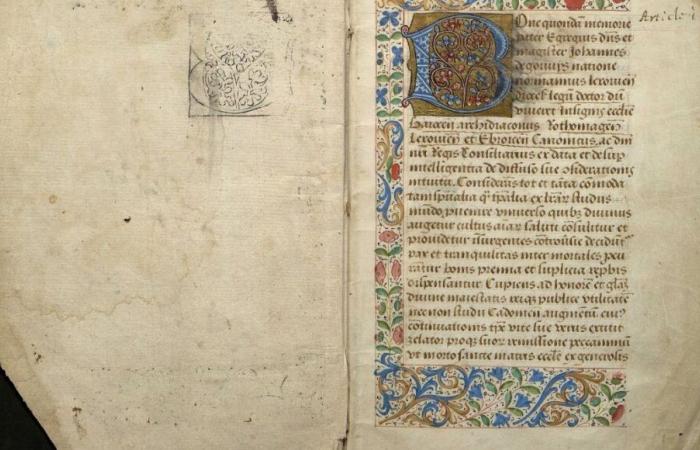
The acquisition is exceptional in more than one way. First of all, it is very rare to find for sale a medieval illuminated manuscript from this period. The object is also in excellent state of conservationfeaturing very beautiful illuminations and even a watermark representing a unicorn visible on one of the endpapers. He finally comes complete the written heritage from the University of Caen.
This manuscript constitutes a unique testimony to the birth of the Collège du Bois
“The establishment was founded in the middle of the 15th century by Nicolas du Bois, canon of Rouen, in a house purchased on rue Saint-Sauveur in Caen, with the financial support of the famous Pierre Cauchon, bishop of Lisieux and accuser of Joan of Arc , explain the Calvados Archives. It hosted seven scholarship recipients, students supported financially by the college’s endowment. They lived on site and received courses linked to the University, based on the model of the college founded by Pierre de Sorbon in Paris which will give its name to the Sorbonne.
The prestige of Collège du Bois will then decline in favor of Collège du Mont. The manuscript is first copy of the statutes of the College. It specifies the terms of the scholarship and the operation of the establishment.
The risk of this document going abroad, the United States being interested
This manuscript is added to the already very rich collection of the Calvados Archives. It contains in particular the statutes of the University of 1439 or the election registers of rectors. But he suffered several significant losses : because of theft or loss since the end of the 18th century, but also of course because of destruction of June 1944 which caused a large part of the University library to disappear.
“Today, it is therefore one of these major pieces which finds Caen, continue the Departmental Archives in a press release. It also avoids a departure from France, which unfortunately seemed possible given the interest of the United States in particular for this type of documents.”
The manuscript was digitizedand can be viewed on the Archives website (1J/909). It will also be the subject of a presentation during the visits offered by the Calvados Archives during theyear of commemoration of the millennium of Caen in 2025.
France





